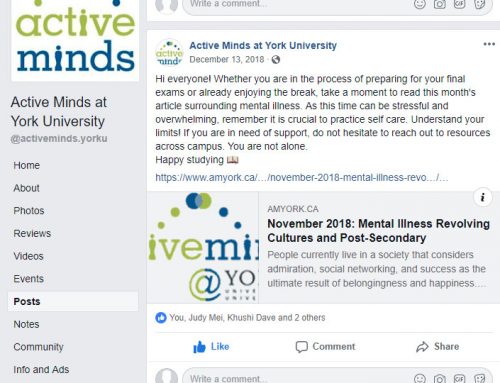Every January since 2011, the telecommunications company, Bell, has spread its Bell Let’s Talk initiative, aiming to decrease the stigma of mental health. Over the next few weeks, you are bound to see the #BellLetsTalk hashtag on social media and might begin thinking of your own mental health. If you’ve been struggling with your mental health or feel that you have been unable to cope with certain stressors in your life, it might be beneficial to seek the advice of a medical professional. Here is a complete guide to help you start your journey in mental health treatment.
Admitting that you need treatment.
The first step in working towards improving your mental health is recognizing that you are experiencing mental health issues in the first place. You may not have a diagnosis, you may think that you’re the only person who has ever experienced what you’re going through. That’s okay. If you feel like you have been experiencing an unreasonable amount of stress, anxiety, depression, mood swings, or simply feel like you’re not feeling your best, you deserve treatment. Whether you’re experiencing intense depression, or minor stress, seeing a mental health professional can be beneficial.
Diagnosing how you’re feeling.
You may have suspected that you’re suffering from a mental health disorder, such as Bipolar Disorder or Obsessive-Compulsive Disorder. Or you may not even know if what you’re feeling has a name. If you’d like for your mental health to be assessed, to see if you are suffering from an issue that can be diagnosed, you will need to do a psychological assessment (usually a self-report questionnaire where you describe how you’ve been feeling). The York University Psychology Clinic offers psychological assessments for the cost of $2000, usually with a 12-month waitlist.
Understandably, this is a long wait and might be too high of a cost for you. In that case, I would recommend visiting your family doctor or a walk-in clinic. Explain how you’re feeling and express that you’d like to be assessed. They can refer you to a psychologist to do an assessment for free.
After the diagnosis, or not being diagnosed at all.
If you are diagnosed with a mental health disorder, you, along with your doctor and the psychologist to which your doctor referred you, can make a plan to begin tackling your mental health difficulties. You might decide that weekly or biweekly sessions with a psychologist might be best. During these sessions, you can explain your feelings and define some goals you would like to work on with your psychologist. Currently, some diagnoses are only treatable with medication. If you require medication or would like to try it out and see if it will benefit you, you will most likely be referred to a psychiatrist, a psychological professional who specializes in administering medications. They will help you find a medication and a dosage that works best for you.
However, not everyone needs to be diagnosed with a disorder to access psychotherapy. As I mentioned above, having an assessment can be costly, and the wait times might not work for you. If you don’t want to be assessed, you can ask your doctor for a referral to a psychologist (a professional who provides psychotherapy for more serious mental health issues) or a psychotherapist (a professional who provides psychotherapy and counselling for less serious mental health difficulties).
Searching for your own therapist.
While it might be best to speak to your doctor about your mental health difficulties, you might not feel comfortable about speaking to your doctor, or you would simply like to skip the step of speaking to your doctor. In this case, you can find a psychologist or a psychotherapist yourself. The York University Psychology Clinic is currently accepting new patients to provide therapy. If you’d like to go somewhere else, you can search on PsychologyToday.com or simply Google “Psychotherapy in Toronto.” You can look at different therapists close to you, view how much they charge for an hour session, and see what types of people they have experience in treating. You can call or email them to see if they are accepting new patients, and even ask for a free 15-minute consultation to see if you connect with this therapist! Don’t be discouraged if you do not connect with the first therapist you meet with. It’s okay to discontinue sessions with a therapist and find a new one who better fits your needs.
Emergencies
The wait times for many mental health treatments in Ontario can be terribly long. It may not be the best option for you to wait on a month-long waiting list if your mental health difficulties require urgent attention. If you need to speak to someone immediately, there are a few crisis hotlines you can call to speak to a professional. You can find the numbers here: camh.ca/en/health-info/crisis-resources. If you need even more immediate help, do not hesitate to call 911 or go to the emergency room of the nearest hospital. They will provide you with inpatient treatment (treatment that will require you to stay at the hospital for around one to two weeks) or outpatient treatment (treatment such as group or individual therapy that you can access a few times per week).
Costs
Psychological treatment is only covered by OHIP if your psychologist works under a Family Health Team (a specific type of health care provider where a doctor, nurse, social worker, psychologist, physiotherapist, and other health care providers work out of the same building). However, this is very uncommon. If your doctor is a solo-practitioner, walk-in doctor, or is just a general practitioner who does not practice psychotherapy–this is the most common–then psychotherapy will not be covered by OHIP.
Emergency situations at a hospital or with a crisis line are also free, but these are for emergency situations, not long-term treatment.
Because the Ontario government does not cover other mental health treatments, you will likely have to pay for your treatment.
Your employer, or your parents’ employer, might provide benefits for you to access psychotherapy from a social worker, psychotherapist, or psychologist. The York Federation of Students Health and Dental Plan offers $60 per visit for up to $600 per year in benefits when accessing psychotherapy.
Lastly, some psychotherapists or psychologists offer “sliding scales.” This means that they review your financial situation and offer a payment plan based on that. This allows people who cannot afford their regular rate to access psychotherapy.
I hope this guide has helped you in your decision to begin accessing treatment!



























